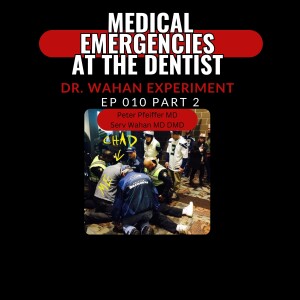
Tuesday Nov 26, 2024
ep 010: Medical Emergencies at the Dentist part 2
keywords
perioperative emergencies, cardiac events, daylight savings, medical emergencies, simulation training, allergic reactions, patient management, anesthesia, emergency preparedness, healthcare training
summary
In this conversation, Dr. Serv Wahan and Dr. Peter pfeiffer discuss various aspects of perioperative emergencies, including the prevalence of cardiac and respiratory issues during surgeries, the impact of daylight savings time on cardiac events, and real-life experiences with medical emergencies. He emphasizes the importance of having proper training and equipment, such as AEDs, in medical settings. The discussion also covers the management of hypotension and hypertension in patients, allergic reactions, and the significance of simulation training for emergency preparedness. Overall, the conversation highlights the critical nature of being prepared for medical emergencies in both dental and medical practices.
takeaways
- Perioperative emergencies are relatively rare but can be serious.
- Daylight savings time can increase the risk of cardiac events.
- Real-life experiences in emergencies highlight the need for preparedness.
- AEDs are essential in any medical or dental office.
- Training and simulation improve emergency response skills.
- Managing blood pressure in patients requires careful consideration.
- Allergic reactions can escalate quickly and require immediate action.
- Epinephrine is crucial for treating anaphylaxis.
- Experience and training are vital in handling emergencies.
- Emergencies can happen to anyone, regardless of experience.
titles
- Navigating Perioperative Emergencies
- The Hidden Dangers of Daylight Savings
Sound Bites
- "Daylight savings time causes heart attacks."
- "AEDs save lives. That's a thing."
- "You need this. Nobody could find an AED."
- "You have to have reps, right?"
Chapters
00:00 Understanding Perioperative Emergencies
03:03 The Impact of Daylight Savings on Cardiac Events
05:55 Real-Life Emergency Experiences in Medical Settings
09:13 Managing Hypotension and Hypertension in Patients
12:06 Addressing Allergic Reactions and Anaphylaxis
14:57 The Importance of Simulation Training for Emergencies
19:11 The Role of Experience in Emergency Situations
No comments yet. Be the first to say something!